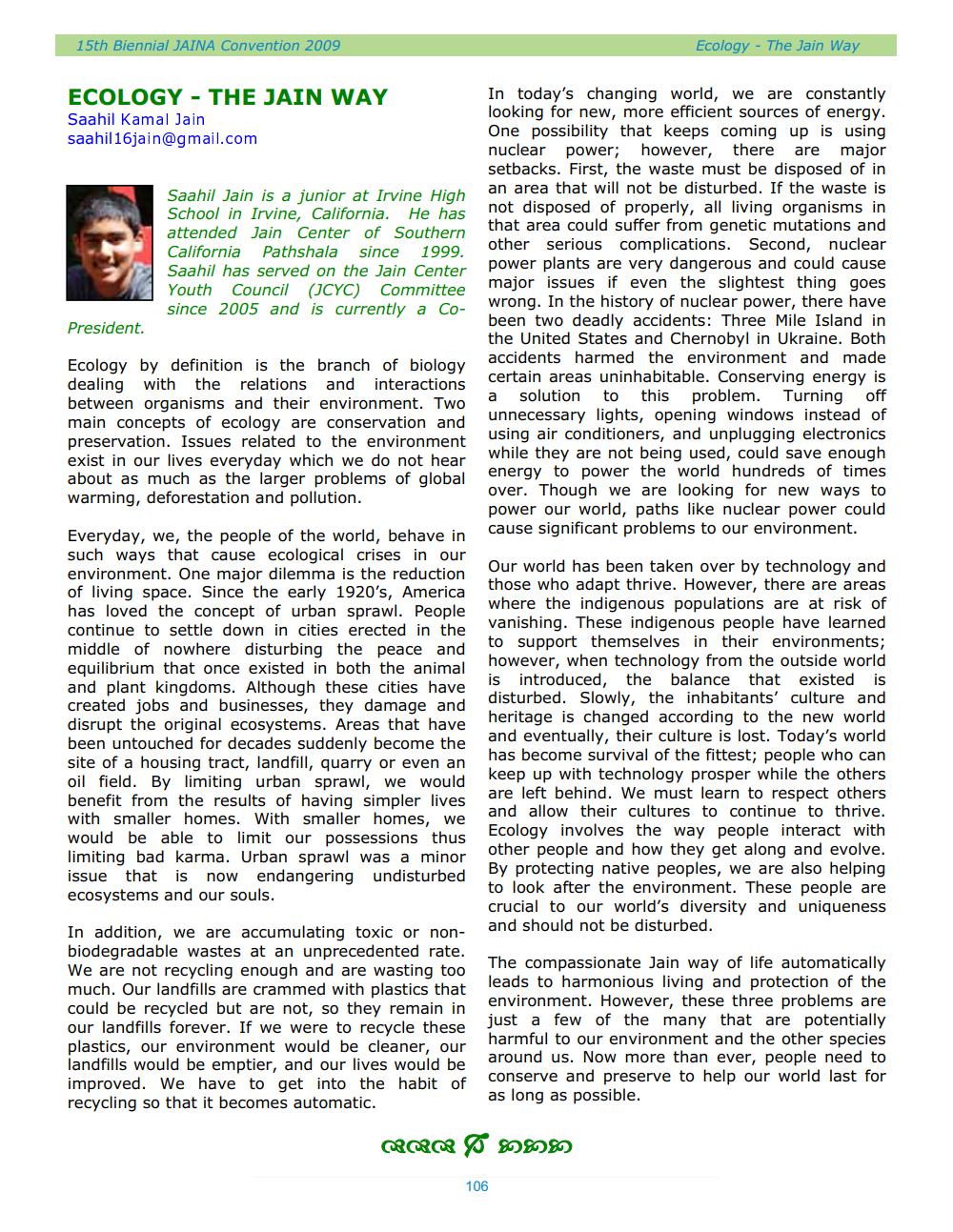________________
15th Biennial JAINA Convention 2009
Ecology - The Jain Way
ECOLOGY - THE JAIN WAY Saahil Kamal Jain saahil
[email protected]
Saahil Jain is a junior at Irvine High School in Irvine, California. He has attended Jain Center of Southern California Pathshala since 1999. Saahil has served on the Jain Center Youth Council (ICYC) Committee since 2005 and is currently a co
In today's changing world, we are constantly looking for new, more efficient sources of energy. One possibility that keeps coming up is using nuclear power; however, there are major setbacks. First, the waste must be disposed of in an area that will not be disturbed. If the waste is not disposed of properly, all living organisms in that area could suffer from genetic mutations and other serious complications. Second, nuclear power plants are very dangerous and could cause major issues if even the slightest thing goes wrong. In the history of nuclear power, there have been two deadly accidents: Three Mile Island in the United States and Chernobyl in Ukraine. Both accidents harmed the environment and made certain areas uninhabitable. Conserving energy is a solution to this problem. Turning off unnecessary lights, opening windows instead of using air conditioners, and unplugging electronics while they are not being used, could save enough energy to power the world hundreds of times over. Though we are looking for new ways to power our world, paths like nuclear power could cause significant problems to our environment.
President.
Ecology by definition is the branch of biology dealing with the relations and interactions between organisms and their environment. Two main concepts of ecology are conservation and preservation. Issues related to the environment exist in our lives everyday which we do not hear about as much as the larger problems of global warming, deforestation and pollution.
Everyday, we, the people of the world, behave in such ways that cause ecological crises in our environment. One major dilemma is the reduction of living space. Since the early 1920's, America has loved the concept of urban sprawl. People continue to settle down in cities erected in the middle of nowhere disturbing the peace and equilibrium that once existed in both the animal and plant kingdoms. Although these cities have created jobs and businesses, they damage and disrupt the original ecosystems. Areas that have been untouched for decades suddenly become the site of a housing tract, landfill, quarry or even an oil field. By limiting urban sprawl, we would benefit from the results of having simpler lives with smaller homes. With smaller homes, we would be able to limit our possessions thus limiting bad karma. Urban sprawl was a minor issue that is now endangering undisturbed ecosystems and our souls.
Our world has been taken over by technology and those who adapt thrive. However, there are areas where the indigenous populations are at risk of vanishing. These indigenous people have learned to support themselves in their environments; however, when technology from the outside world is introduced, the balance that existed is disturbed. Slowly, the inhabitants' culture and heritage is changed according to the new world and eventually, their culture is lost. Today's world has become survival of the fittest; people who can keep up with technology prosper while the others are left behind. We must learn to respect others and allow their cultures to continue to thrive. Ecology involves the way people interact with other people and how they get along and evolve. By protecting native peoples, we are also helping to look after the environment. These people are crucial to our world's diversity and uniqueness and should not be disturbed.
In addition, we are accumulating toxic or nonbiodegradable wastes at an unprecedented rate. We are not recycling enough and are wasting too much. Our landfills are crammed with plastics that could be recycled but are not, so they remain in our landfills forever. If we were to recycle these plastics, our environment would be cleaner, our landfills would be emptier, and our lives would be improved. We have to get into the habit of recycling so that it becomes automatic.
The compassionate Jain way of life automatically leads to harmonious living and protection of the environment. However, these three problems are just a few of the many that are potentially harmful to our environment and the other species around us. Now more than ever, people need to conserve and preserve to help our world last for as long as possible.
ROC8 898989
106
